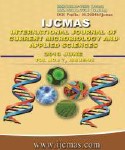


 National Academy of Agricultural Sciences (NAAS)
National Academy of Agricultural Sciences (NAAS)

|
PRINT ISSN : 2319-7692
Online ISSN : 2319-7706 Issues : 12 per year Publisher : Excellent Publishers Email : editorijcmas@gmail.com / submit@ijcmas.com Editor-in-chief: Dr.M.Prakash Index Copernicus ICV 2018: 95.39 NAAS RATING 2020: 5.38 |
Klebsiella species belonging to the family Enterobacteriaceae, are known to cause a variety of human infections such as pneumonia, urinary tract infections, septicaemia, soft tissue infections and are an important cause of healthcare associated infections. The emergence of multidrug resistant Klebsiella is a growing problem worldwide. Klebsiella spp. are one of the most common organisms to carry plasmids encoding ESBL enzyme. They are associated with higher rates of treatment failure and death. In this study, we intend to detect the different species of Klebsiella causing infections and analyze their antibiogram including extended spectrum beta lactamase production. A retrospective study was conducted in the department of Microbiology in a tertiary care hospital. Patient samples in which Klebsiella species was isolated were included in the study. Sample processing and isolate identification was done using standard laboratory techniques. Antimicrobial susceptibility testing and ESBL screening was performed by Kirby Bauer’s disc diffusion method as per CLSI guidelines. A total of 210 Klebsiella spp. were isolated. Sputum (35.7%) was the most frequently received specimen and 94.8% isolates were K. pneumonia. Highest sensitivity was seen towards imipenem. Among urinary isolates, norfloxacin was the least effective drug. 68.6% isolates were ESBL producers. There are limited therapeutic options for treatment with multidrug resistant organisms. Hence, it is becoming very important to prevent colonization and infection by implementing and periodically reinforcing appropriate infection control measures.
 |
 |
 |
 |
 |